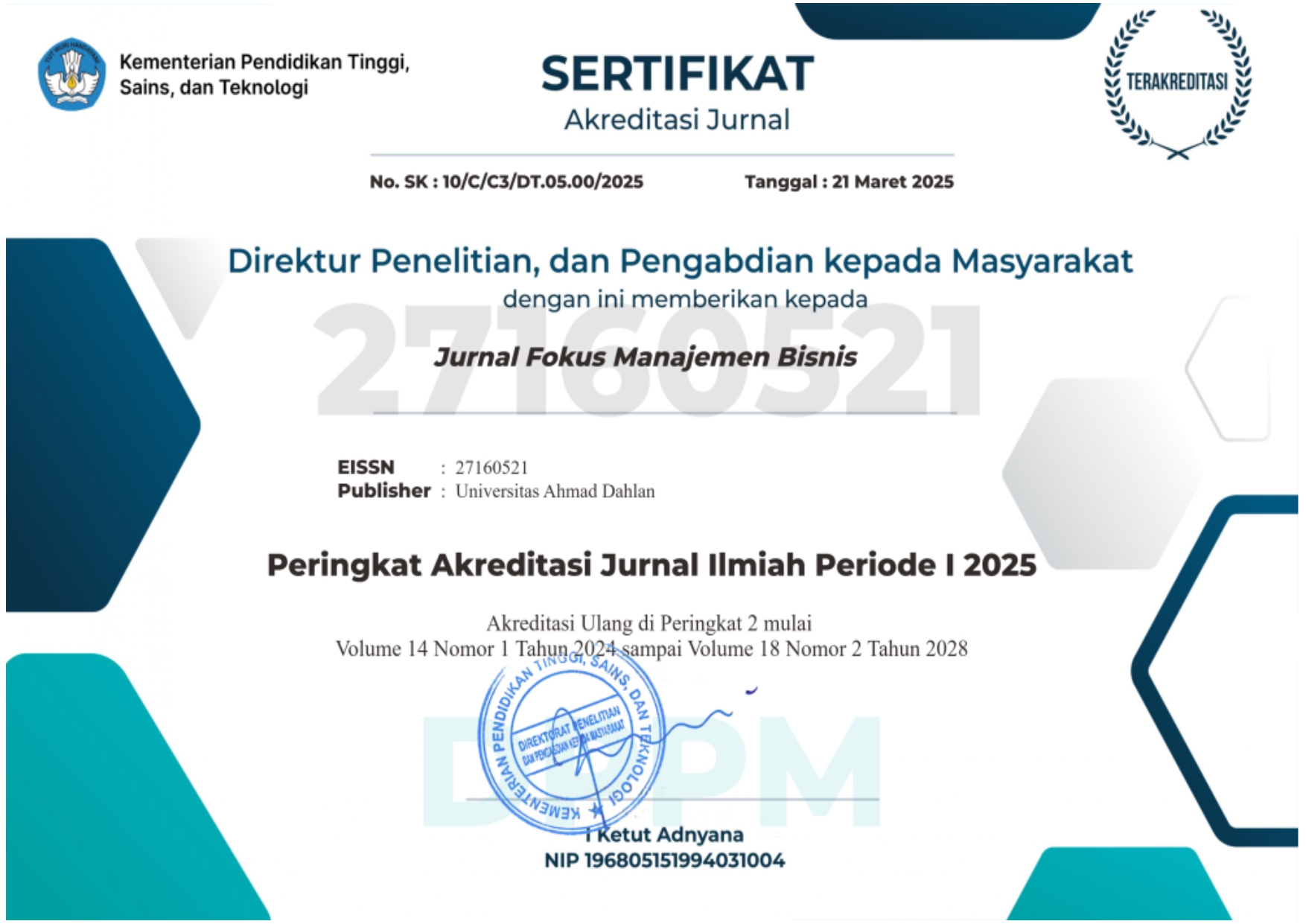PERAN MEDIASI MOTIVASI KERJA PADA PENGARUH GAYA KEPEMIMPINAN TRANSAKSIONAL DAN KOMPENSASI TERHADAP KINERJA KARYAWAN
DOI:
https://doi.org/10.12928/fokus.v10i2.2419Keywords:
Transactional Leadership Style, Compensation, Work Motivation, Performance.Abstract
This study aims to examine the effect of transactional leadership style and compensation on employee performance mediated by work motivation on the employees of the Sleman Regency. Sampling in this study uses probability method because the population of employees in the Regional Water Supply Company (PDAM) Sleman Regency is quite a lot to be studied. Data collection techniques using a questionnaire distributed by the Director of PDAM Sleman. Data analysis techniques using the application SPSS version 21 include validity test, reliability test, descriptive statistics, classic assumption test, multiple linear regression test, hypothesis test, and coefficient of determination. The results of this study indicate that the transactional leadership style variable has a positive and significant effect on work motivation, compensation has a positive and significant effect on work motivation, transactional leadership has a positive and significant effect on employee performance, work motivation has a positive and significant effect on employee performance, compensation has a positive and significant effect on employee performance, transactional leadership has a positive and significant effect on employee performance mediated by motivation, compensation has a positive and significant effect on employee performance mediated by motivation. The most dominant influence is work motivation variable, then compensation variable is followed
References
Awan, Taruk Todingallo Delvi. (2014). Pengaruh Kepemimpinan Transaksional terhadap Motivasi Kerja Karyawan. E-Journal Administrasi Bisnis.
Barling, J., Kelloway, F. Kelvin, & Frone, Michael R. (1999). Handbook of Work Stress. California: Sage Publications Inc.
Deiva, D. K. (2017). Analisis Pengaruh Kepemimpinan Transaksional dan Pengembangan Karir terhadap Kinerja
Karyawan dengan Motivasi Kerja sebagai Variabel Intervening. Jurnal Administrasi Bisnis (JAB), 1–11.
Dito, A. H. (2010). Pengaruh Kompensasi terhadap Kinerja Karyawan dengan Motivasi Kerja sebagai Variabel Intervening. Journal of Chemical Information and Modeling, 1–126.
Gerardine, E., & Belinda, G. (n.d.). Pengaruh Kompensasi terhadap Kinerja Karyawan dengan Motivasi Kerja sebagai Mediasi. Jurnal Administrasi Bisnis (JAB), 528– 539.
Ghozali, I. (2011). Aplikasi Analisis Multivariate dengan Program IBM SPSS 19. Penerbit Universitas Diponegoro.
Ghozali, I. (2013). Model Persamaan Struktural dengan Konsep dan Aplikasi dengan Program SPSS 21. In Jurnal Administrasi Bisnis (JAB).
Hakim, A. (2017 ). Penga r u h Gaya Kepemimpinan Transaksional dan Motivasi terhadap Kinerja Karyawan. E-Journal Administrasi Bisnis, 1–157.
Harshanty, A. W. (2011). Pengaruh Motivasi terhadap Kinerja Karyawan. Ilmu Ekonomi.
Hasibuan, Malayu. (2012). Manajemen Sumber Daya Manusia. Jakarta: Bumi Aksara
Insan, A. N. (2017). Pengaruh Kepemimpinan Transaksional terhadap Motivasi Intrinsik, Work Engagement dan Kinerja Karyawan. Jurnal of Business Studies, 2(1), 18.
Juliningrum, Emmy dan Achmad Sudiro. (2013). Pengaruh Kompensasi, Budaya Organisasi, terhadap Motivasi Kerja dan Kinerja Karyawan. Jurnal Aplikasi Manajemen. Volume 11. Nomor 4.
Kasenda, R. (2013). Kompensasi dan Motivasi Pengar uhnya terhadap Kinerja Karyawan. Jurnal Riset Ekonomi, Manajemen, Bisnis Dan Akuntansi, 1(3), 853–859.
Kom a rd i , Da d i . ( 20 0 9). Pe nga r u h Kepemimpinan Transformasional dan Transaksional serta Motivasi Kerja terhadap Kinerja dan Kepuasan Individual Karyawan dalam Organisasi Perusahaan Industri Telekomunikasi. Jurnal Aplikasi Manajemen, Maret 7(1)
Mahdinezhad, M., Suandi, T. Bin, Silong, A. D., & Omar, Z. B. (2013). Transformational, Transactional Leadership Styles and Job Performance of Academic Leaders. International Education StudiesInternational Education Studies, 6(11), 29–34. https://doi.org/10.5539/ies. v6n11p29
Nikoyama, B. (2019). Pengaruh Kompensasi dan Gaya Kepemimpinan terhadap Kinerja Karyawan dengan Motivasi sebagai Variabel Intervening. Jurnal Riset Ekonomi, Manajemen, Bisnis dan Akuntansi, 1–77.
Onsardi, Moch. Asmawi, T. A. (2017). The Effect of Compensation, Empowerment, and Job Satisfaction on Employee Loyalty. International Journal of Scientific Research and Management, 05(12), 7590–7599.
Prawirosentono, Suyadi. (2008). Kebijakan Kinerja Karyawan. Yogyakarta: BPFE.
Rahmawati, F. (2016). Pengaruh Pelatihan, Motivasi, dan Kompensasi terhadap Kinerja Karyawan dengan Kepuasan Kerja sebagai Variabel Intervening.
Jurnal Ilmiah Progresif Manajemen Bisnis (JIPMB).
Rivai. (2014). Manajemen Sumber Daya Manusia untuk Perusahaan. Bandung: Remaja Rosda Karya.
Rizal, M., Idrus, M. S., & Mintarti, R. (2014). Effect of Compensation on Motivation, Organizational Commitment and Employee Performance. International Journal of Business and Management Invention, 3(2), 64–79.
Robbins. (2011). Perilaku Organisasi. Jakarta: Salemba Empat.
Sastrohadiwiryo, B. Siswanto. (2003). Manajemen Tenaga Kerja Indonesia. Jakarta: Bumi Aksara.
Septiana, D. (2013). Peran Motivasi dalam Memediasi Pengaruh Kepemimpinan Transformasional dan Transaksional terhadap Kinerja. Journal of Chemical Information and Modeling, 53(9), 1–94.
Sobel, M. E. (1982). Asymptotic Confidence Intervals for Indirect Effect in Structural Equation Models. In S. Leinhardt (Ed.), Sociological Methodology 1982 (pp. 290-312).Washington DC: American Sociological Association
Sugiyono. (2014). Metodologi Penelitian Bisnis. Cetakan Ke Enam Belas. Bandung: Alfabeta.
Uno, Hamzah B. (2009). Teori Motivasi dan Pengukurannya. Jakarta: Bumi Aksara.
Downloads
Published
How to Cite
Issue
Section
License
Authors who publish with this journal agree to the following terms:Â
- Authors retain copyright and grant the journal right of first publication with the work simultaneously licensed under a Creative Commons Attribution License that allows others to share the work with an acknowledgment of the work's authorship and initial publication in this journal.
- Authors are able to enter into separate, additional contractual arrangements for the non-exclusive distribution of the journal's published version of the work (e.g., post it to an institutional repository or publish it in a book), with an acknowledgment of its initial publication in this journal.
- Authors are permitted and encouraged to post their work online (e.g., in institutional repositories or on their website) prior to and during the submission process, as it can lead to productive exchanges, as well as earlier and greater citation of published work (See The Effect of Open Access).






